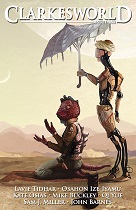“Gubbinal” by Lavie Tidhar
Reviewed by Victoria Silverwolf
All five original stories in the latest issue of this award-winning magazine are science fiction. Settings range from Earth, to other planets in the Solar System, to interstellar space.
The unusual title of “Gubbinal” by Lavie Tidhar does not appear in the story itself. Research reveals that this peculiar word comes from a 1923 poem by Wallace Stevens. Quoting it in full may help illuminate the story’s themes.
Gubbinal
That strange flower, the sun,
Is just what you say.
Have it your way.
The world is ugly,
And the people are sad.
That tuft of jungle feathers,
That animal eye,
Is just what you say.
That savage of fire,
That seed,
Have it your way.
The world is ugly,
And the people are sad.
The story takes place on Titan. The protagonist makes a living by pursuing self-reproducing machines that create strange objects, which she sells to collectors. During one such expedition, she encounters a woman whose modified body allows her to survive on the surface of Titan without a spacesuit. She is on her own quest, in search of a mysterious artifact that may not exist. Complicating matters are space pirates, who, for their own reasons, oppose this search.
The author creates a strange, complex future. In some ways, it is as mysterious as Stevens’ poem. Readers of science fiction will recognize allusions to 2001: A Space Odyssey. As in Arthur C. Clarke’s novel and the classic film adapted from it, this story has a climax that is open to interpretation. The reader is likely to feel both intrigued and frustrated by it.
The characters in “A Gaze of Faces” by Mike Buckley live under the surface of a lifeless world circling a distant star. A century or so before the story begins, a starship from Earth landed with their ancestors. The descendants do not know why. Some of them venture deep into the interior of the planet, where the starship’s library is stored. It contains data, in the form of virtual reality simulations, on nearly all of human history. An important gap in its available knowledge is the reason for leaving Earth. The protagonists retrieve simulated people from the past in order to obtain information, eventually discovering the origins of their society.
The story contains much more than this, not always to its benefit. In particular, an alien parasite that attaches itself to people when they reach adulthood, replacing their natural faces with an imitation, is irrelevant to the plot. The fact that a rival gang seizes control of the library from the protagonists and their allies exists only to provide violent action.
In “The James Machine” by Kate Osias, a man dying of cancer and his wife create an artificial intelligence simulating his personality. The plot deals with the relationship between the woman and the AI after his death. The author makes it clear that the AI is not a replacement for the man, but an independent personality.
This story deals with themes of freedom and individuality in a powerful way. Given the level of technology portrayed in this near future world, the ending is difficult to believe, but is emotionally effective.
The protagonist of “For What are Delusions if Not Dreams?” by Osahon Ize-Iyamu is one of millions of artificial intelligences that control power systems. An unexpected error gives this particular AI full consciousness. It thinks of itself as human. This causes a crisis during a major power failure, as the AI is no longer able to select the correct course of action without doubting its decision. The plot of this story is not as coherent as this description suggests. The narration is often confusing.
“To Fly Like a Fallen Angel” by Qi Yue (translated by Elizabeth Hanlon) takes place underground after a nuclear holocaust renders the surface uninhabitable. Despite this apocalyptic event, the people in the subterranean world enjoy a technologically advanced society. They even have wings that, with the help of artificial winds, allow them to fly. A woman receives a message to meet an ex-lover. He claims that slaves, living in permanent darkness, support their luxurious society. Their encounter leads to a wild adventure for the woman. She eludes police determined to stop her at any cost. She enters a hidden place and discovers its bizarre secrets. Eventually she learns the truth about her world, which is completely different from what it seems to be.
This story moves at a breakneck pace. The final revelation of what is really going on requires long paragraphs of exposition. The open-ended climax is likely to disappoint some readers.
Victoria Silverwolf saw a double rainbow recently.
 Clarkesworld #142, July 2018
Clarkesworld #142, July 2018